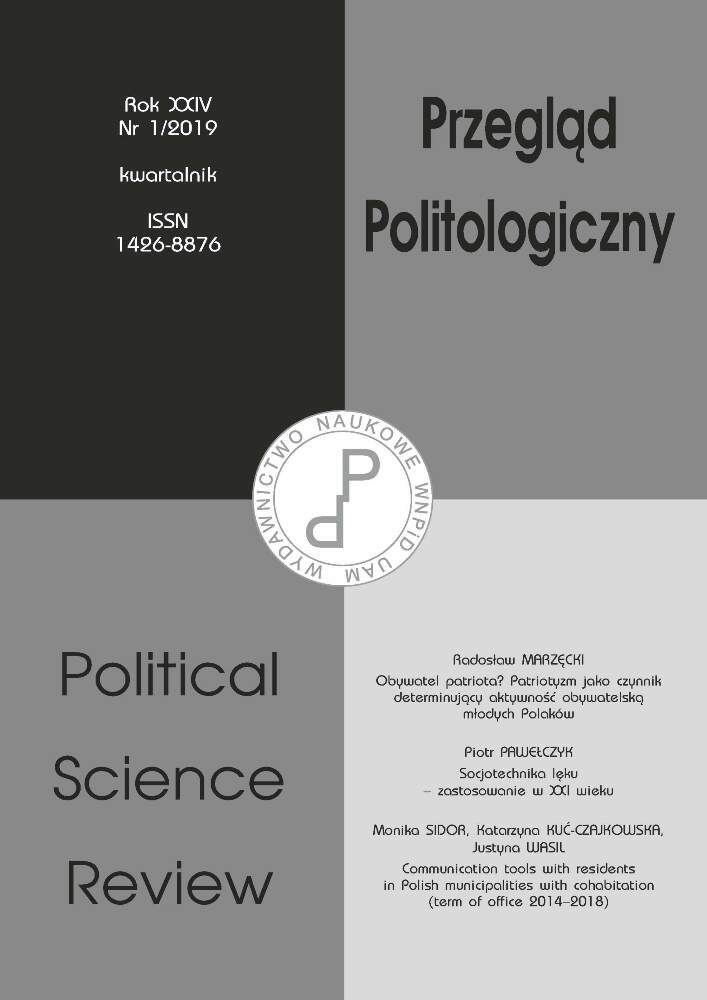Abstract
The analysis of the attitude of Italian citizens to social challenges - political and economic, assessed from the point of view of their own (non)religiousness, is the purpose of this study. Two methods were used during the study. The comparative one, which allows indicating the diversity of views of socio-religious groups, and the statistical one, including the quantitative and qualitative approach.The implementation of the chosen goal was based on the adoption of research hypotheses confirmed by the collected material. First of all: on many issues, the views of believers are consistent with the opinions of non-believers and distant in relation to the official position of the Church and hierarchy. Secondly, the views of people declaring themselves as believers differ, which proves that religion is not the primary reference for assessing changes within the political system. In the field of research, the change and collapse of the image of a culturally homogenous state can be noticed. The religious homogeneity of Italy does not confirm the growing number of people declaring themselves as non-believers and non-Catholic religionists. This is also not confirmed by the diversity within the group of Catholics who, in the assessment of social phenomena and political events, are inclined to follow non-religious reasons, mainly programs of right-wing parties, often populist and anti-system, which many Italian Catholics support.
References
Dudala R. (2018a), Italian migration policy: Changes and Effects, „Review of Nationalities” [in print].
Dudala R. (2018b), Leadership in the Time of Populism: selected examples of Italian political leaders, „Political Preferences” [in print].
I cattolici tra presenza nel sociale e nuove domande alla politica (2017), https://web.archive.org/web/20180124122738/http://wwwacli.it/wp-content/uploads/2017/n/Cattolici-e-politica-analisi-Ipsos-novembre-2017.pdf, 04.11.2018.
Ius soli, Ius culturae. Un dibattito sulla cittadinznza dei giovani mogranti, Associazione Neodemos https://www.fieri.it/wp-content/uploads/2017/11/E-book-IUS-SOLI3.pdf, 04.11.2018.
Le religioni in Italia (2018), https://cesnur.com/il-pluralismo-religioso-italiano-nel-contesto-postmoderno-2/, 30.10.2018.
Luckmann T. (1967), The Invisible Religion. The Problem of Religion in Modern Society, Macmillan, New York.
Micklethwait J., Wooldridge A. (2009), God Is Back. How the Global Revival of Faith Is Changing the World, Penguin Press, New York.
Modifiche alla legge 5 febbraio 1992, n. 91 e altre disposizioni in materia di cittadinanza, https://www.senato.it/leg/17/BGT/Schede/Ddliter/46079.htm, 04.11.2018.
Norris P., Inglehart R. (2005), Sacred and Secular. Religion and Politics Worldwide, Cambridge University Press.
Pollard J. (2008), Catholicism in Modern Italy: Religion, Society and Politics, 1861 to the Regolamen-tazione delle unioni civili tra persone dello stesso sesso e disciplina delle convivenze (2016), no. 76, 20 May 2016, “Gazzetta Ufficiale,” no. 118, 21 May 2016.
Present, Routledge, London-New York.
The Pew-Templeton Global Religious Futures Project (2009-), http://www.globalreligiousfutures.org, 30.10.2018.
Wile R. (2013), The ‘Best’ Countries In The World Have Changed A Lot Since 1988, https://www.businessinsider.com/wond-economist-where-to-be-born-index-2013-1?IR=T, 04.11.2018.

